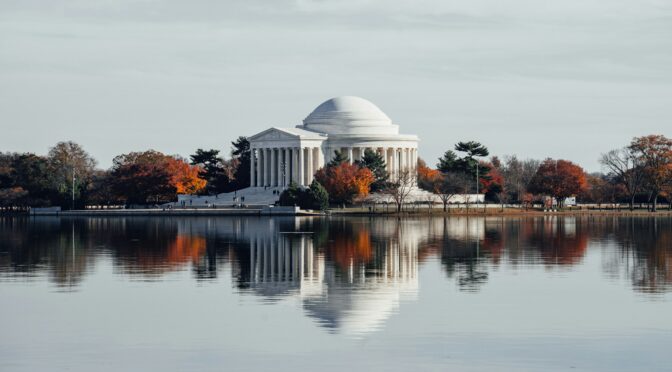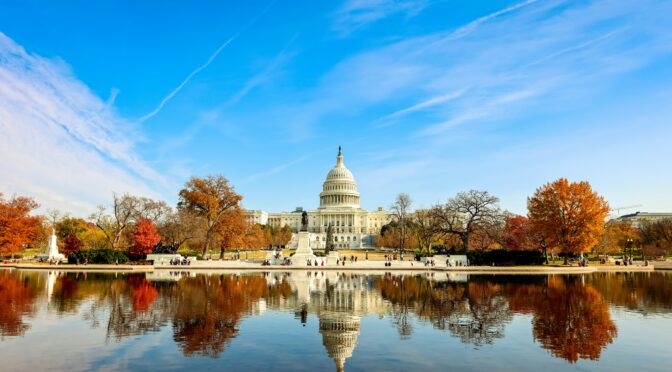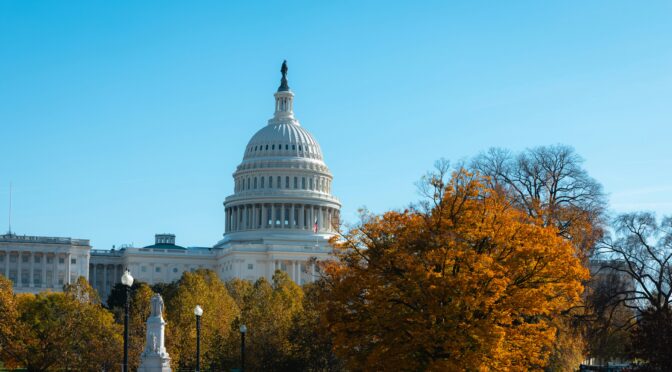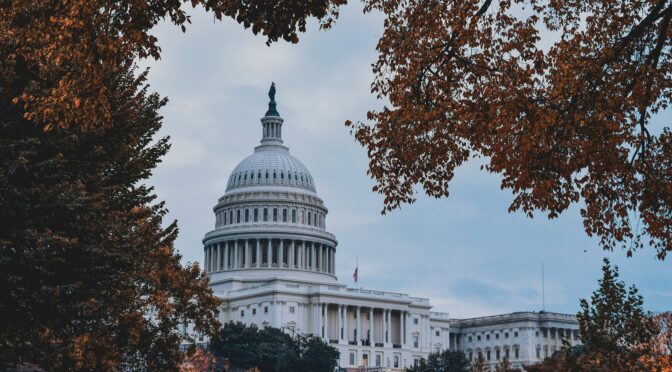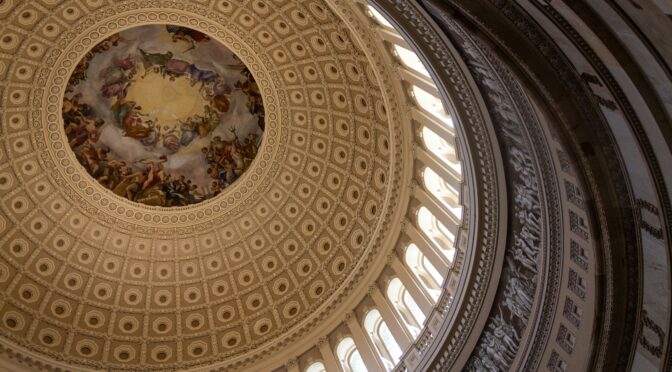By Sean Robins, NACAC’s director of advocacy
Welcome to this issue of the Advocacy Update on NACAC’s Admitted blog. As the federal shutdown stretches into its fifth week, the impact across education, childcare, and public service continues to grow. From canceled TRIO grants and delayed Head Start funding to deepening uncertainty around college access and affordability, these disruptions underscore the importance of informed, engaged advocacy — especially as national policy decisions increasingly shape the future of students and institutions alike.
As Election Day approaches on Tuesday, Nov. 4, we encourage everyone to make a plan to vote and to review the nonpartisan resources shared during our recent webinar. Participating in elections — local, state, and national — is one of the most meaningful ways to support our communities and the students we serve. Whether you vote early, by mail, or in person on Election Day, please take time to ensure your voice is heard. Every vote helps shape the future of education and advances our shared mission to expand access and opportunity for all students.
Policy & Legislative Updates
The federal government shutdown has entered its fifth week, with escalating consequences across education, child care, and public service. In the Senate, efforts to ensure federal workers are paid have stalled, as both Republican and Democratic proposals failed to advance. While Senators Ron Johnson (R-WI) and Chris Van Hollen (D-MD) have begun bipartisan talks, the administration continued to pay military personnel under uncertain authority and has suggested that back pay for furloughed workers may not be required — contradicting existing law. The ongoing stalemate has already cost the economy at least $7 billion in lost productivity, according to the Congressional Budget Office, with losses potentially reaching $14 billion if the shutdown continues through November.
The shutdown’s ripple effects are spreading across schools and colleges. K–12 leaders are bracing for steep cuts to federal support, with many districts preparing budgets that assume the elimination of Titles II, III, and IV-A next year. More than three-quarters of school and district leaders expect funding to decline, and some have already reduced staff or delayed academic initiatives. The uncertainty follows the administration’s summer freeze on billions in federal education dollars and proposals to eliminate key K–12 programs.
In higher education, the Trump administration’s anti-DEI campaign has led to the cancellation of 120 TRIO programs — cutting off more than 43,000 low-income, first-generation, and veteran students from vital college access resources such as tutoring and FAFSA support. The move marks a significant departure from decades of bipartisan commitment to TRIO’s mission. Meanwhile, a new Quinnipiac poll shows that nearly 60 percent of Americans oppose the administration’s plan to expand federal control over higher education through its proposed “compact,” underscoring broad public resistance to political interference in colleges and universities.
The administration’s actions are also fueling economic insecurity for families. The U.S. Department of Agriculture (USDA) reversed earlier guidance, announcing it lacks authority to sustain the Supplemental Nutrition Assistance Program (SNAP) during the shutdown — putting food benefits for more than 42 million Americans at risk. Food banks nationwide are preparing for increased demand, and bipartisan groups of lawmakers have urged USDA to use all available funds to prevent a lapse in benefits.
Lawmakers from both parties are urging USDA to reconsider. More than 200 House Democrats and 46 Senate Democrats sent letters calling on Secretary Brooke Rollins to use the contingency fund and transfer authority to prevent a lapse in benefits. Senate Appropriations Chair Susan Collins (R-Maine) joined them in a separate letter, urging USDA to “consider all available options” to sustain benefits, including partial payments or fund transfers.
Education and childcare programs face similar strain. Starting Nov. 1, more than 65,000 children in 134 Head Start centers are expected to lose funding, while districts reliant on Impact Aid will miss payments that offset lost tax revenue. Twenty-five states have now sued USDA over its SNAP decision, warning of widespread harm to students and families.
Courts have begun to intervene as well. A federal judge has indefinitely blocked the Trump administration’s attempt to lay off thousands of federal workers during the shutdown, calling the move unlawful and retaliatory. Another judge reinstated nearly $1 billion in Bipartisan Safer Communities Act (BSCA) mental health grants that the Education Department had abruptly discontinued, ruling the decision “arbitrary and capricious.”
Within higher education policy, negotiations continue over graduate loan limits under OBBBA. The department has proposed a narrow set of professional programs eligible for higher loan caps, raising concerns that students in high-need fields like mental and physical health could lose access to necessary financing.
Meanwhile, new details have emerged about the administration’s broader efforts to reshape higher education through punitive enforcement. Newly released documents reveal sweeping demands placed on UCLA — including a $1.2 billion fine, restrictions on gender-affirming care and trans athletes, limits on foreign student enrollment, and bans on overnight protests. Faculty leaders have condemned the proposal as “ideological extortion,” warning that it threatens academic freedom, institutional autonomy, and global competitiveness.
Across the country, institutions are grappling with the implications of these federal actions. College leaders remain uncertain about the administration’s Compact for Academic Excellence, with some voicing opposition but others hesitating to formally reject it amid confusion over potential funding consequences. As political pressure mounts, Texas Christian University announced plans to dissolve its race and gender studies departments, citing low enrollment. Faculty members say the move reflects growing political pressure on diversity, equity, and inclusion-related programs and signals a retreat from decades of progress toward equity and inclusion.
Even as the federal climate grows more restrictive, new research highlights alternative paths to equity. A report from the Institute for Higher Education Policy (IHEP) examines California’s nearly three decades of experience expanding access under a race-neutral framework. After the state’s 1996 ban on affirmative action, California invested in K–12 to higher education pathways, holistic admissions, and integrated data systems linking education and workforce sectors. While equity gaps persist, recent gains in enrollment show how race-neutral strategies — if paired with intentional investment — can expand opportunity in a post-SFFA landscape.
In Congress, a small group of Hispanic Republican lawmakers are breaking ranks with the administration’s anti-DEI agenda, urging the restoration of $350 million in funding for Hispanic-Serving Institutions. Their push underscores the tension between opposition to diversity, equity, and inclusion and recognition of the programs that expand opportunity for diverse student populations.
The administration has also finalized a rule restricting eligibility for the Public Service Loan Forgiveness (PSLF) program, barring employees of organizations deemed to have a “substantial illegal purpose.” Critics warn the policy could be used to target nonprofits that disagree with the administration’s views, raising significant First Amendment concerns.
With negotiations stalled, education funding uncertain, and key social supports at risk, the shutdown continues to deepen its impact on students, families, and federal workers alike — threatening both short-term stability and long-term recovery.
NACAC Advocacy
This week, NACAC continued its work to defend college access and opportunity through both federal engagement and member mobilization. NACAC joined higher education partners in opposing a proposed Department of Homeland Security rule that would prioritize H-1B visa petitions based on wage levels—a change that would severely limit post-graduation work opportunities for international students. The proposed rule threatens to deter international enrollment, restrict pathways for early-career professionals educated in the U.S., and weaken the diversity and competitiveness of U.S. campuses and the broader economy.
At the same time, NACAC shared an action alert as part of the Student Aid Alliance, urging members to contact Congress and oppose proposed cuts to critical student aid programs. The House has advanced a funding bill that would eliminate the Federal Supplemental Educational Opportunity Grant (FSEOG) and reduce Federal Work-Study (FWS) by nearly 40 percent — cuts that would disproportionately harm low-income students and undermine college affordability nationwide. NACAC continues to advocate for preserving these essential investments that make higher education accessible for millions of students each year.
Ways You Can Take Action
We are continuously updating our Take Action page with opportunities to make your voice heard. If you have not already, I encourage you to advocate on the urgent issues below. You can also view all active advocacy campaigns in the yellow column of the Take Action page.
- Tell Congress: Protect FSEOG and Work-Study Funding
- Tell Congress: Save TRIO and Support College Access
- Tell Congress: Prioritize Visa Appointments for International Students and Scholars
- Urge Congress to Protect Postsecondary Pathways
- Tell Congress: International Students are Essential to America’s Safety, Economy, and Global Strength
- Tell Congress to Not Abandon Our National Commitment to Education
- Urge Congress to Protect Disabled Students
- Don’t Flunk the Future Advocacy Toolkit
As this challenging period for students, families, and institutions continues, the importance of advocacy has never been clearer. Each message sent to a lawmaker, each action taken through NACAC’s campaigns, and each conversation about the value of higher education helps strengthen our collective voice. Change rarely happens all at once — it builds through steady, determined effort.
As Marian Wright Edelman reminds us, “If you don’t like the way the world is, you change it. You have an obligation to change it. You just do it one step at a time.”
Each step we take — as advocates, educators, and engaged citizens — brings us closer to ensuring that every student has the opportunity to learn, grow, and succeed.

